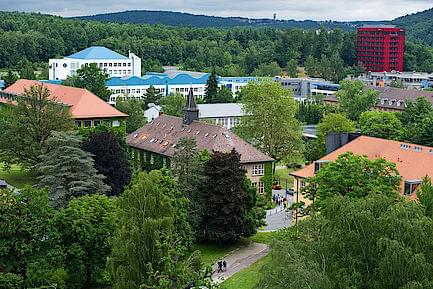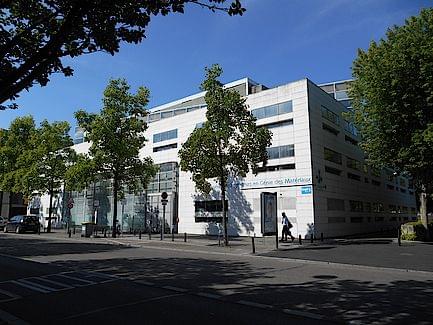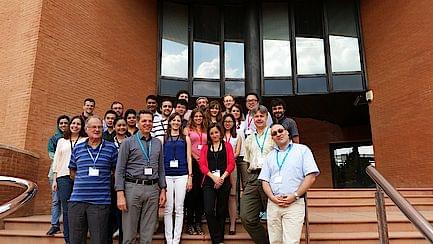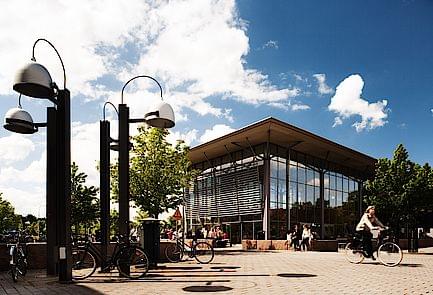Consortium
Partner universities
The DocMASE doctoral programme is a joint cooperation by:
- Universität des Saarlandes in Saarbrücken, Germany
- Université de Lorraine in Nancy, France
- Universidad Politécnica de Cataluña in Barcelona, Spain
- Luleå Tekniska Universitet in Luleå, Sweden
- Linköpings Universitet in Linköping, Sweden
Besides the five partner universities, 20 associated partners from academia, research and industry take part in DocMASE.
Universität des Saarlandes (UdS – Saarbrücken, Germany)

The Saarland University is located in Saarbrücken, Saarland, a German state just on the border with France. The proximity to France and Luxembourg as well as its location within the heart of Europe make it an attractive place to study, especially for international students. About 19% of its 16.900 students come from all over the world.
The 8 faculties provide a broad spectrum of disciplines, offering several integrated international courses.
The Materials Science and Engineering Department (MSE) of Saarland University is recognised as one of the leading centres of materials science in Germany. The department is formed by 11 chairs covering the wide spectrum of materials science. Scientific research at the university greatly benefits from the close collaboration with distinguished research centres situated on the university campus:
- Fraunhofer Institute for Non-Destructive Testing (IZfP),
- Leibniz Institute of New Materials (INM),
- Material Engineering Center Saar (MECS).
International scientists are well-integrated staff members (22 invited scientists in the last years through Feodor-Lynen Scholarships, German Academic Exchange Service (DAAD), Alexander von Humboldt Fellowships, German Research Foundation (DFG), EU-Alfa, etc.).
Université de Lorraine (UL – Nancy, France)

The Lorraine University is the result of the fusion of the following four universities:
- Nancy-I
- Nancy-II
- Paul-Verlaine – Metz
- INPL
Materials Science and Engineering is particularly attractive, with the newly created world class Jean Lamour Institute (IJL) resulting from the merge of 5 Laboratories dedicated to materials science being located in Nancy. As a mark of distinction, this institute cooperates as a Mixed Research Unit (UMR) with the National Centre for Scientific research (CNRS), the leading research institution in Europe and fourth in the world.
The renown of the UL is based on the excellence of its laboratories and schools, some of which are over a hundred years old. All of them have a strong identity which, thanks to their respective network of recruitment and professional or industrial relations, garners them a great reputation and widespread recognition.
Universitat Politècnica de Catalunya (UPC – Barcelona, Spain)

The Barcelona Tech specialises in the fields of architecture, engineering and science. It is recognised as one of the top engineering universities of Spain and was one of the first in the country to award an Engineering degree in Materials Science and Engineering. UPC has 30.155 undergraduate students, ca. 1.300 master students, ca. 3.000 doctorate students, 4.100 students in internships, and 2.200 in international exchange programmes. UPC is the Spanish university with the highest number of master and doctoral students from abroad and largest number of double degree programmes (82 in total).
The department involved in DocMASE has a staff of 55 professors and lecturers, 27 persons belonging to the technical and administrative staff, and about 50 PhD students. They carry out their tuition and research tasks at the different schools. The personnel of the department also carries out research, technology transfer and innovation tasks at different centres such as: Catalan Plastics Centre (CCP), Manresa Technological Centre (CTM), Institute of Bioengineering of Catalonia (IBEC), Centre for Structural Integrity and Reliability of Materials (CIEFMA), and Centre for nano-engineering (CnRE).
Materials Science and Engineering has contributed greatly in making UPC Spain’s technical university with the highest scientific production, the highest citable output, the highest research competitiveness and the largest research income.
Luleå Tekniska Universitet (LTU – Luleå, Sweden)

Luleå Tekniska Universitet has 5 campuses with a total of 12500 students. The department of Applied Physics, Mechanical, and Materials Engineering is one of 13 at LTU. The department has a teaching staff of 59 persons and 88 enrolled PhD students. The research activities range from basic science to applied projects. The link to industry is very strong and enrolled students all work on projects in collaboration with industry representatives.
International programmes have a long tradition in this field of study: the EEIGM (Integrated programme in Materials Science – Germany, France, Spain, Sweden) has already been running for 19 years (more than 650 Alumni, 300 with double degrees). Furthermore there exists a Transatlantic Atlantis BSc in Materials Science and Mechanical Engineering (with Germany and USA). Additionally, three international Master programmes, AMASE, EEIGM and an exchange programme with Argentina, called I.DEAR are also available to students.
Linköpings universitet (LiU, Linköping, Sweden)

Linköpings Universitet has approximately 27.000 students and 4.000 employees with an annual turnover of approximately 360 M€ (2016). Natural sciences and engineering make up the largest part of LiU’s postgraduate studies. 205 graduated with a PhD-degree in 2008.
Materials science is a top research priority at LiU, carrying out exciting world-class fundamental research in areas carefully selected to have a high potential for significant societal payoff. The scientific focus is the design of advanced and multifunctional materials contributing to the metal, paper, energy, microelectronics/IT/communications sectors, and the life sciences. LiU materials research encompasses 240 researchers organised into collaborating teams.
Current research and scientific training at LiU involves 315 professors, 600 PhD students, 30 licentiate degrees and 170 doctoral degrees.




